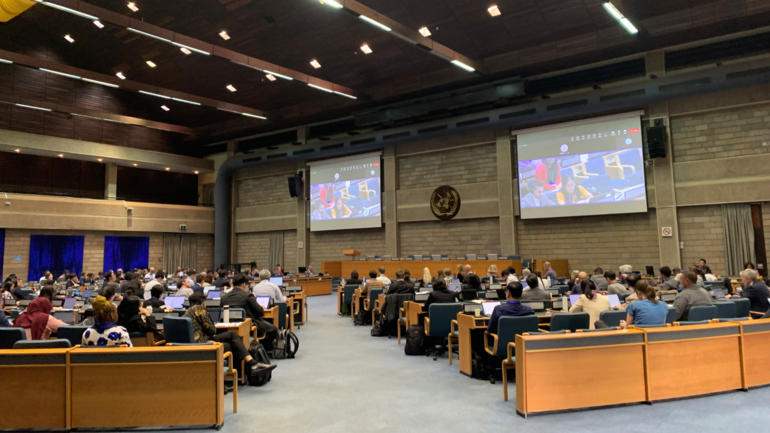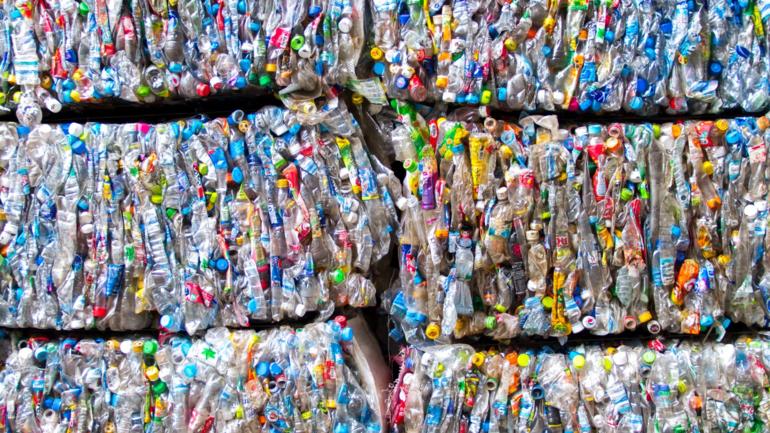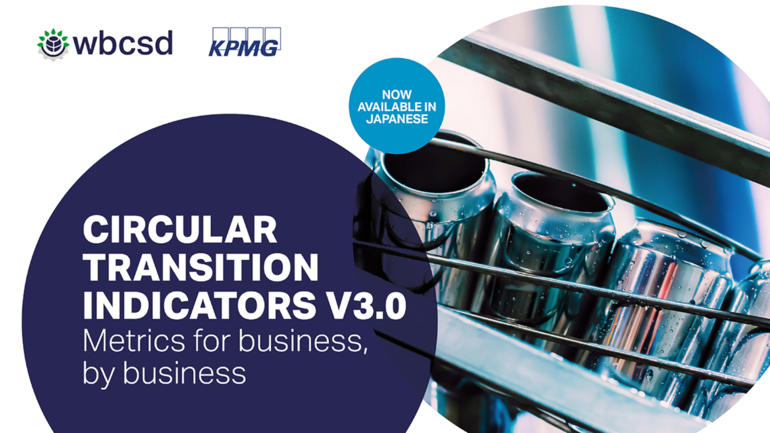Technologies of the Fourth Industrial Revolution show a huge potential and could lead to “dematerialization”, better product tracking, take-back and recycling, and products sold as services.
USD $62.5 billion in materials lost in approximate annual 50 million tonnes of e-waste which could nearly triple by 2050.
In brief:
- Seven UN entities have come together, supported by the World Economic Forum and the World Business Council for Sustainable Development to better address e-waste challenges.
- A new joint report shows that the world now discards approximately 50 million tonnes of electronic and electrical waste (e-waste) per year, greater in weight than all of the commercial airliners ever made, or enough Eiffel towers to fill Manhattan. Only 20% is formally recycled. The United Nations University predicts e-waste could nearly triple to 120 million tonnes by 2050 if nothing changes.
- In terms of material value, this presents an opportunity worth over USD $62.5 billion per year, more than the GDP of most countries and three times the output of the world’s silver mines. There is 100 times more gold in a tonne of e-waste than a tonne of gold ore.
- The joint report calls for a new vision for electronics based on the circular economy and the need for collaboration with major brands, small and medium-sized enterprises (SMEs), academia, trade unions, civil society and associations in a deliberative process to change the system.
- The report points to the importance of new technologies; although e-waste is growing, technologies from Internet of things to cloud computing show a huge potential and could lead to “dematerialization” and better product tracking, take-back and recycling.
- Major global brands, governments and other organizations support the initiative with commitments and projects to address e-waste and build a circular economy.
Davos, Switzerland, 24 January 2019: Seven UN entities have come together, supported by the World Economic Forum and the World Business Council for Sustainable Development (WBCSD), to call for an overhaul of the current electronics system, with the aim of supporting international efforts to address e-waste challenges.
The report calls for a systematic collaboration with major brands, small and medium-sized enterprises (SMEs), academia, trade unions, civil society and associations in a deliberative process to reorient the system and reduce the waste of resources each year with a value greater than the GDP of most countries.
Each year, approximately 50 million tonnes of electronic and electrical waste (e-waste) are discarded – the weight of more than all commercial airliners ever made. In terms of material value, this is worth USD $62.5 billion – more than the GDP of most countries.
Less than 20% of this is recycled formally. Informally, millions of people worldwide (over 600,000 in China alone) work to dispose of e-waste, much of it done in working conditions harmful to both health and the environment.
The report, “A New Circular Vision for Electronics – Time for a Global Reboot,” launched in Davos today, says technologies such as cloud computing and the internet of things (IoT), support gradual “dematerialization” of the electronics industry.
Meanwhile, to capture the global value of materials in the e-waste and create global circular value chains, the report also points to the use of new technology to create service business models, better product tracking and manufacturer or retailer take-back programs.
The report notes that material efficiency, recycling infrastructure and scaling up the volume and quality of recycled materials to meet the needs of electronics supply chains will all be essential for future production.
And if the electronics sector is supported with the right policy mix and managed in the right way, it could lead to the creation of millions of decent jobs worldwide.
The joint report calls for collaboration with multinationals, SMEs, entrepreneurs, academia, trade unions, civil society and associations to create a circular economy for electronics where waste is designed out, the environmental impact is reduced and decent work is created for millions.
The new report supports the work of the E-waste Coalition, which includes:
- International Labour Organization (ILO);
- International Telecommunication Union (ITU);
- United Nations Environment Programme (UN Environment);
- United Nations Industrial Development Organization (UNIDO);
- United Nations Institute for Training and Research (UNITAR);
- United Nations University (UNU), and
- Secretariats of the Basel and Stockholm conventions.
The Coalition is supported by the World Business Council for Sustainable Development (WBCSD) and the World Economic Forum and coordinated by the Secretariat of the Environment Management Group (EMG).
Considerable work is being done on the ground. For example, in order to grasp the opportunity of the circular economy, today the Nigerian Government, the Global Environment Facility and UN Environment announce a USD $2 million investment to kick off the formal e-waste recycling industry in Nigeria. The new investment will leverage over USD $13 million in additional financing from the private sector.
According to the International Labour Organization, in Nigeria up 100,000 people work in the informal e-waste sector. This investment will help to create a system which formalizes these workers, giving them safe and decent employment while capturing the latent value in Nigeria’s 500,000 tonnes of e-waste.
Another Platform for Accelerating the Circular Economy (PACE) report launched today by the World Economic Forum, with support from Accenture Strategy, outlines a future in which Fourth Industrial Revolution technologies provide a tool to achieve a circular economy efficiently and effectively, and where all physical materials are accompanied by a digital dataset (like a passport or fingerprint for materials), creating an 'internet of materials.' PACE is a collaboration mechanism and project accelerator hosted by the World Economic Forum which brings together 50 leaders from business, government and international organizations to collaborate in moving towards the circular economy.
Statements
International Telecommunication Union (ITU)
“ITU has been raising awareness and guiding efforts to reduce and rethink e-waste since 2011. So I am delighted to see that a movement to promote a circular economy for electronics is now gaining ground. Together, with newly created partnerships such as the United Nations E-waste Coalition, we can transform waste into wealth, and deliver development benefits to all.” Houlin Zhao, Secretary-General, ITU.
United Nations Environment Programme (UN Environment)
“A circular economy brings with it tremendous environmental and economic benefits for us all. UN Environment is proud to support this innovative partnership with the Government of Nigeria and the Global Environment Facility and support the country’s efforts to kick start a circular electronics system. Our planet’s survival will depend on how well we retain the value of products within the system by extending their life.” Joyce Msuya, Acting Executive Director, UN Environment.
World Business Council for Sustainable Development (WBCSD)
“Global e-waste is the fastest growing waste stream and presents societal and environmental risk. This summary clearly lays out why we must act at scale, now, and collaborate between business, international organizations, governments and NGOs. WBCSD is committed, through Factor10 and the Alliance to End Plastic Waste, to achieving a world where waste has no place.” Peter Bakker, President and CEO, World Business Council for Sustainable Development.
International Labour Organization (ILO)
“Thousands of tonnes of e-waste is disposed of by the world’s poorest workers in the worst of conditions, putting their health and lives at risk. We need better e-waste strategies and green standards as well as closer collaboration between governments, employers and unions to make the circular economy work for both people and planet.”' Guy Ryder, Director-General, ILO.
United Nations University (UNU)
“UNU's and its world-wide partners’ research and advocacy of sustainable e-waste practices have substantially contributed to placing the issue of electronic waste on the political agenda. But current efforts are insufficient to address this fast-growing problem. We need to develop innovative policies. We need to establish and monitor targets so we can measure whether our policies have any impact. We need new multi-stakeholder alliances, because reducing e-waste will require the cooperation of many actors, including the private sector. We hope that the E-Waste Coalition and this report will instigate the important innovation required.” David Malone, Rector, UNU & UN Under-Secretary General.
United Nations Industrial Development Organization (UNIDO)
“E-waste is a growing global challenge that poses a serious threat to the environment and human health worldwide. To minimize this threat, UNIDO works with various UN agencies and other partners on a range of e-waste projects, all of which are underpinned by a circular economy approach. This UN coalition is taking steps towards a cleaner, more sustainable and safer future, and in doing so, demonstrating how such cooperation can lead to transformational results where the total is greater than the sum of its parts.” Stephan Sicars, Director, Department of Environment, UNIDO.
United Nations Institute for Training and Research (UNITAR)
“Working together with the UN coalition on E-waste presents a new paradigm shift and a new dispensation with tremendous opportunities to support countries march towards a cleaner and more sustainable way of managing e-waste. UNITAR recognizes urgent needs in training and capacity building in the e-waste management value chain based on the national training needs assessment, and we are pleased to support this partnership and countries through our programmes.” Nikhil Seth, Executive Director, UNITAR.








